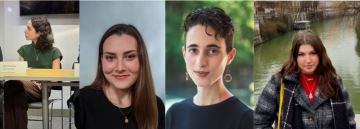2022-23 REEESNe Essay Competitions

Event Type:
Essay Competition
Event description:
REEESNe held its 2022-23 Essay Competition for students at Russian, East European, & Eurasian Studies Northeast network institutions. Prizes of up to $1,000 were offered for the top English-language essays in three categories: Master’s-level long-form scholarly essays, Undergraduate-level long-form scholarly essays, and Open-level short-form essays (scholarship or public-facing pieces). See below for information on how to submit by the deadline of May 31st, 2023.

2022-2023 Prize Winners, left to right: Nora Furlong, Diana Gor, Hilah Kohen, and Alice Volfson (photographs by Jack La Piana, Diana Gor, Gabbie Law, and Josh Hughes)
The competitions:
The Marina Ledkovsky Prize for best short-form essay by an undergraduate or Master’s student honors a well-loved professor of Russian language and literature. Long respected as a Turgenev scholar, Dr. Ledkovsky (1924-2014) received her PhD at Columbia University and subsequently taught there and at Barnard College, while her work within and about the Russian Orthodox Church and her editing in collaboration with Charlotte Rosenthal and Mary Zirin of the influential Dictionary of Russian Women Writers (Greenwood, 1994) put her knowledge to significant use beyond academia, demonstrating the impact that short, targeted, well-evidenced writing can have on public understandings of arts and institutions. This year’s Ledkovsky Prize went to two winners: Diana Gor, a recent graduate of Hunter College, whose essay “The Townspeople as the ‘Cultural Body’ of Totalitarianism in Evgeny Shvarts’ The Dragon” is a highly polished and convincing close reading of Shvarts’s play that balances engagement of existing scholarship with interpretation of passages from the play while taking different stagings into consideration to make an original argument about the complacency of the townspeople onstage; and Alice Volfson, a graduating senior at Connecticut College, whose thesis chapter “The Migration of Black Americans to the Soviet Union in the Interwar Period: The Communist International and the ‘Negro Question’” stands alone as both a deep dive into the historical arguments of emerging scholarship and, in the span of a few pages, as an introduction that unpacks ample and valuable content gleaned through original work in archives (with microfiche, no less!). Honorable mention goes to Hunter College’s Nicole Gonik for the essay “‘Every man must have somewhere to go’: Movement in Tolstoy’s War and Peace and Dostoevsky’s Crime and Punishment.”
The Carlos Pascual Prize for best long-form essay by a Master’s student is named for the former U.S. Ambassador to Ukraine (2000-2003) and to Mexico (2009-2011). The career that Ambassador Pascual built following his Master’s degree from Harvard, his work in several State Department positions relating to Europe and Eurasia, and the research and communications initiatives that he oversaw to authenticate the tapes of then-president of Ukraine Leonid Kuchma all speak to the ambitions, vision, skills, and dedication that REEESNe seeks to help its member institutions to cultivate and reward in their Master’s students. The winner of this year’s Pascual Prize is the University of Pennsylvania’s Hilah Kohen, whose essay “From Juhuri to Gĩkũyũ: The Global Circulation of Language Choice in the Soviet Era” introduces a refreshing and compelling theory of circulation that accounts for the worldwide impact of texts that, although they do not travel as text products, nonetheless affect literary worlds outside of their immediate (linguistically constrained) circles. Focusing on Juhuri (Judeo-Tat) texts and the writer Khizgil Avshalumov, whose influence is belied by his small Juhuri-literate public, the essay asserts the importance of tracing literary circulation in the face of world lit. critics and empirically verifiable, yet factually obscuring, accounts of the imperial suppression of minor literatures. Honorable mention goes to Columbia University’s Elise Schlecht for the essay “Outliving Obsolescence: Longevity, Ideology, and Style in Soviet Mass Housing.”
The James Billington Prize for best long-form essay by an undergraduate student is dedicated to the United States’ 13th Librarian of Congress (1987-2015). A widely published historian of Russia, prior to heading the Library of Congress Dr. Billington (1929-2018) received degrees from Princeton University and the University of Oxford, taught at Princeton and Harvard University, and directed the Woodrow Wilson International Center for Scholars, where he founded the Kennan Institute for Advanced Russian Studies. This year’s Billington Prize was shared by two students: Nora Furlong of Bard College, whose essay “The Poet Won’t Die: Authorial Death in Varlam Shalamov’s Kolyma Tales” is to be celebrated for its incisive close readings and impressive engagement with secondary scholarship; and Connecticut College’s Alice Volfson, whose thesis chapter “The Migration of Black Americans to the Soviet Union in the Interwar Period: Oliver Golden and the Agricultural Group” mobilizes a commendable amount of research in order to make an original argument about African Americans in the USSR. Honorable mention goes to Yale University’s Kathryn Yeager for the essay “Kazakh Internal Opposition to the 1928 Soviet Confiscation Campaign.”

2022-2023 Honorable Mention Recipients, left to right: Nicole Gonik, Elise Schlecht, and Kathryn Yeager (photographs by Victoria Gonik, Linnea Harwell, and Weston Kerekes)